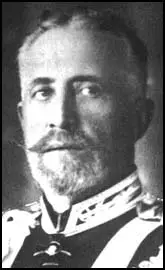Grand Duke Nikolai Nikolayevich Romanov

Grand Duke Nikolai Nikolayevich Romanov, the eldest son to Grand Duke Nicholas Nicolaevich (1831–1891) and Alexandra Petrovna (1838–1900), the second cousin of Tsar Nicholas II, was born on 6th November 1856.
He was educated at the school of military engineers and received his commission in 1872. During the Russo-Turkish War (1877-78), he worked with his father who was commander in chief. He worked his way up through all the ranks until he was appointed commander of the Guard Hussar Regiment in 1884.
There was considerable suffering during the Russo-Japanese War. Prices of essential goods rose so quickly that real wages declined by 20 per cent. When four members of the Assembly of Russian Workers were dismissed at the Putilov Iron Works, Father Georgi Gapon called for industrial action. Over the next few days over 110,000 workers in St. Petersburg went out on strike.
In an attempt to settle the dispute, Father decided to make a personal appeal to Nicholas II. He drew up a petition outlining the workers' sufferings and demands. This included calling for a reduction in the working day to eight hours, an increase in wages, an improvement in working conditions and an end to the Russo-Japanese War.
When the procession of workers reached the Winter Palace it was attacked by the police and the Cossacks. Over 100 workers were killed and some 300 wounded. The incident, known as Bloody Sunday, started what became known as the 1905 Revolution. Strikes took place all over the country and the universities closed down when the whole student body complained about the lack of civil liberties by staging a walkout. Lawyers, doctor, engineers, and other middle-class workers established the Union of Unions and demanded a constituent assembly.
Sergi Witte, the new Chief Minister, advised the Tsar Nicholas II to make concessions. Nikolai Romanov agreed and urged the Tsar to bring in reforms. The Tsar refused and instead ordered him to assume the role of a military dictator. The Grand Duke refused, drew his pistol and threatened to shoot himself on the spot if the Tsar did not endorse Witte's plan. The Tsar eventually agreed and published the October Manifesto. This granted freedom of conscience, speech, meeting and association. He also promised that in future people would not be imprisoned without trial. Finally he announced that no law would become operative without the approval of the State Duma.
The Grand Duke was appointed was commander-in-chief of the St. Petersburg Military District. On 29th April, 1907, he married Princess Anastasia of Montenegro, the daughter of King Nicholas of Montenegro. They had a happy marriage but the couple remained childless.
On the outbreak of the First World War Nikolai was appointed Commander in Chief of the Russian Army. However, his deputy, Yuri Danilov, was mainly responsible for decision-making. The Grand Duke was 57 years old and had never commanded armies in the field before. This was a major risk as he was being given responsibility for the largest army ever put into action. He achieved little success and was removed from office when Tsar Nicholas II took control of the Russian Army in September 1915. The Grand Duke was sent to Tiblisi where he worked with General Nikolai Yudenich.
The Grand Duke remained a supporter of reform but his recommendations of constitutional reform were ignored by Tsar Nicholas II and suggested he abdicated during the February Revolution. Nikolai remained in the Crimea until leaving for Italy in March 1919.
Grand Duke Nikolai died in France in 1929.

